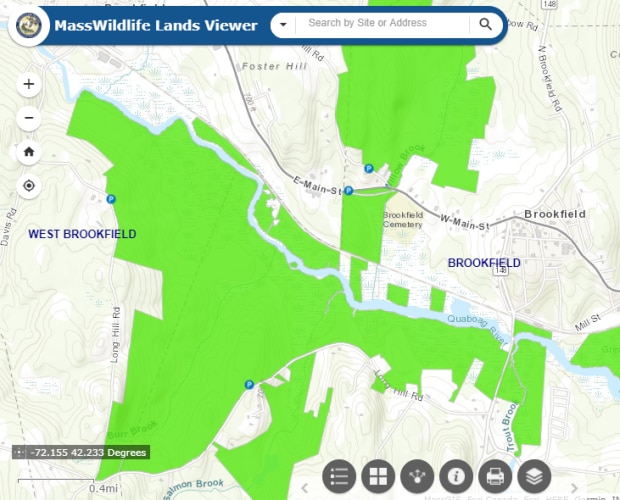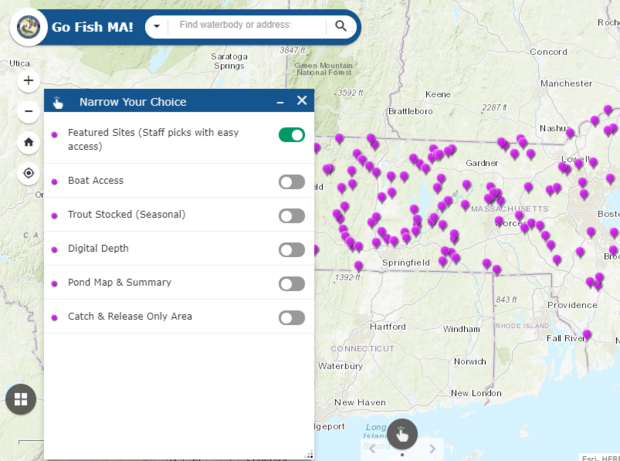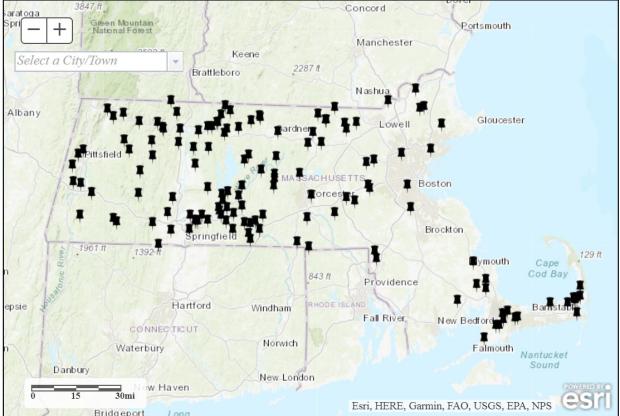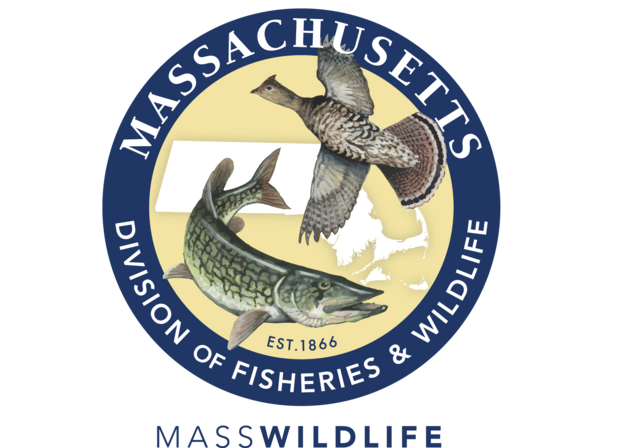Digital WMA maps
Use the MassWildlife Lands Viewer to get digital maps of WMAs across Massachusetts. You can toggle to a satellite view or find your location in real time as you walk the property. WMA property boundaries are updated throughout the year as new lands are acquired.
WMA regulations
- No person shall possess any alcoholic beverage except under permit, or dump or discard any can, bottle, or rubbish.
- No person shall remove vegetation, soil, or stones from any WMA except under permit.
- No person shall use excessive speed in driving a vehicle.
- No person, unless under permit, shall drive or possess any vehicle except on roads or trails maintained for public vehicular traffic.
- No person shall deface or tamper with any sign, building, or equipment.
- No person shall build or maintain a fire without written permission from the Director of the Division of Fisheries and Wildlife or his designee.
- No person shall camp within any WMA without written permission from the Director or his designee.
- No person shall engage in target practice without written permission from the Director or his designee.
- No person shall hunt during the pheasant or quail season on WMAs where pheasant or quail are stocked without wearing a ”hunter orange“ cap or hat except while night hunting for raccoons or opossums or while hunting waterfowl from within a blind or boat.
- No person, except under permit, shall dig or disturb any artifact or archaeological remains.
- The Director may make special regulations to handle special situations peculiar to any WMA. Controlled hunts are in effect at certain times on Martin Burns, Delaney, and Ludlow WMAs. Contact District Manager for details.
- Dogs on Wildlife Management Areas must be leashed. Dogs may be off-leash only when hunting or hunt training with licensed hunters or involved with permitted field trials. Dog feces in WMA parking areas and within 100 feet of the parking area must be picked up by all dog handlers and disposed of off the WMA. Dog feces in other parts of the WMA must be picked up by non-licensed dog handlers and disposed of offsite; licensed hunters are exempt from this requirement.
See full regulations at 321 CMR 3.01(1)
The Director may make special regulations to handle special situations on any WMA. Controlled hunts are in effect at certain times on Martin Burns, Delaney (Northeast District), and Ludlow (Valley District) WMAs.
More about MassWildlife properties
In addition to Wildlife Management Areas, MassWildlife manages other types of properties. These areas conserve valuable wildlife habitat and provide wildlife-related recreational access for the public.
Wildlife Conservation Easements (WCE) are properties where the agency has acquired conservation rights and public recreational access rights in the form of an easement. WCE landowners have agreed to allow public access on all or most of their property. Although title to the property is retained by the landowner, the land is typically open for all wildlife-related forms of recreation including hunting, fishing and trapping.
Access Areas are acquired and managed to provide recreational access to a water body or to conserved lands. WCEs and Access Areas are also shown in the MassWildlife Lands Viewer along with WMAs.
Habitat management on WMAs
MassWildlife restores and manages critical habitats to help conserve the diversity of wildlife and plant communities in Massachusetts. Active habitat projects are taking place on many WMAs. Visitors may see the open habitat types that result from selective tree cutting, mowing, and even prescribed fire. Many species of rare and common wildlife benefit from these activities including songbirds, white-tailed deer, and many kinds of pollinators.
WMAs support rare species
Part of MassWildlife’s land acquisition process takes into account rare species information and uncommon natural communities. See examples of the uncommon animals and habitats that are found on MassWildlife properties.
Help MassWildlife protect habitat
You can support land protection in Massachusetts. Contributions to the Wildlands Fund help pay for the cost of acquiring wildlife habitat. Learn more about the Wildlands Fund.
Other outdoor recreation maps
Go Fish MA!
Plan your next fishing trip with MassWildlife's Go Fish MA! interactive map. Find boat ramps, trout stocked waters, pond and lake summaries, and digital depth information—plus over 100 featured fishing sites that offer easy access to great fishing. Launch map now!
Trout stocking report
Every spring and fall, MassWildlife stocks trout in Massachusetts lakes, ponds, and rivers. Go to Mass.gov/Trout to see where the trout are!
Pheasant stocking location
Every year, MassWildlife stocks about 40,000 ring-necked pheasants statewide on many WMAs and other lands that are open to hunting. Go to Mass.gov/Pheasant to see where stocking happens.
About MassWildlife
MassWildlife is responsible for the conservation of freshwater fish and wildlife in the Commonwealth, including endangered plants and animals. MassWildlife restores, protects, and manages land for wildlife to thrive and for people to enjoy.
Through the effective management of wildlife and habitat, MassWildlife ensures quality outdoor recreational opportunities for hunters, anglers, and outdoor enthusiasts who enjoy the impressive variety of plants, fish, and wildlife found in Massachusetts. Outdoor skills clinics, wildlife education workshops, presentations, and online resources provide all residents with a greater understanding and appreciation for wildlife conservation. Keep in touch with us – sign up to receive monthly e-newsletters.



